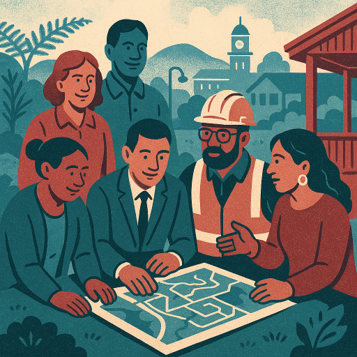MartinJenkins was lucky to have Valentine Parker intern with us over this last summer as part of the TupuToa internship programme. In this article, Valentine shares his thoughts about some of the challenges facing a sector he knows well – hospitality – and about some policy adjustments that could address those challenges.
My introduction to hospitality began working on the door, where I witnessed both the industry’s finest and most challenging moments firsthand. Interning with MartinJenkins over the recent summer has now given me the chance to look at the hospitality sector from a different perspective, and consider government policy settings affecting an industry I have direct experience in.
Businesses have had a hard time thriving in the post-pandemic era. This is particularly true for bars and restaurants, which had lower customer headcounts caused by lockdowns and spatial distancing. In this article I’ll describe the key regulatory areas the industry has been addressing as it recovers, and also look at the potential impact of introducing a ministerial role dedicated to the hospitality sector.
Our hospitality sector plays a massive economic and cultural role
The hospitality sector in New Zealand encompasses cafes, restaurants, takeaway food providers, and bars. In 2021, Infometrics estimated that it directly contributes $7 billion to annual GDP. When considering halo effects, the economic output triples to $21.3 billion. As a comparison, the forestry industry generates an annual export revenue of around $6.6 billion.
Hospitality also significantly contributes to society in various non-economic ways. Hospitality businesses promote manaakitanga and cultural values of respect, generosity, and care for others; they enable numerous micro cultural exchanges; and they also help build communities, with venues serving as hubs where communities get together and build a sense of belonging.
Hospitality intersects many portfolios
In 2023, the title of the ministerial Tourism portfolio was expanded to “Tourism and Hospitality”, highlighting the value of the sector. This raised industry hopes that the government will consider changes to unlock further opportunities in hospitality.
While the Tourism and Hospitality Minister is the Government’s face to the sector, other portfolios hold important regulatory levers. As well as Immigration and Workplace Relations and Safety, the Justice portfolio covers alcohol licensing and sales. The Department of Internal Affairs also administers the Gambling Act 2003, and the Ministry for Primary Industries administers the Food Act 2014 and advises the Minister for Food Safety.
In this context, the Tourism and Hospitality Minister is responsible for supporting and promoting hospitality and representing the views of the industry at the Cabinet table.
I want to dive into the two regulatory areas that, according to a recent survey, are most critical for the industry – immigration, and the sale and supply of alcohol.
Immigration
Immigration is pivotal for New Zealand’s economic growth. Migrants fill critical skill gaps, boosting productivity and innovation across various industries.
The availability of skilled labour is especially vital for the hospitality industry, which relies heavily on a diverse and capable workforce to cater to international visitors – perhaps more than other industries.
It’s easy to see why. Working holiday visa holders are well-placed to meet a significant portion of seasonal demand for labour in locations such as Queenstown. Also, an ethnic restaurant may well source the most qualified staff from the country that developed the cuisine on the menu.
The Accredited Employer scheme can be frustrating for businesses
Much of the industry’s experience accessing migrant labour turns on the operation of the Accredited Employer Work Visa (AEWV), introduced by the previous Government. The aims of the Accredited Employer scheme included ensuring migrant labour filled genuine skills shortages in New Zealand, and also stopping migrants undercutting New Zealand applicants by taking lower wages, and so lowering average wages for all.
The second point is significant for business owners. To be accredited, they had to guarantee a wage above a certain percentage of the median wage (with that percentage depending on the occupation). The impact on businesses was to increase their wage bills. Businesses could pass these costs on to consumers but only as far as customers are willing to pay.
The AEWV also included a “Green List” of occupations that are in high demand, with priority pathways to residency. The Green List is dominated by medical professions and other highly skilled roles. Government of course needs to draw the line somewhere, but the absence of hospitality roles from the Green List is frustrating for a sector that benefits significantly from migrant labour.
A third frustration is that processing of AEWV applications can be slow.
Sector welcoming changes happening in 2025
The current Government has announced changes to the AEWV that should be welcomed by hospitality businesses. In March 2025, the Government will remove the median wage threshold, reducing costs to employers (and potentially downstream costs too). The Government is also getting more efficient in processing applications: the median processing time for an employer accreditation application has gone from 62 calendar days down to 14.

MartinJenkins for the 2024–25 summer
The hospitality sector is now also seeking the reintroduction of industry-specific immigration advisers, to help employers and migrant workers navigate the application process. It argues this could help with challenges identified by a BusinessNZ report on compliance and small businesses, which included navigating regulatory changes, complexity, uncertainty, and delays around visa approvals.
Alcohol and licensing
In New Zealand, the Sale and Supply of Alcohol Act 2012 governs alcohol laws and licensing. Key provisions include age restrictions, licensing requirements for businesses, and regulations on where and when alcohol can be sold. Local councils can also impose alcohol bans in public spaces.
It's easy to understand why government regulates the availability of alcohol. The total social cost of alcohol harm is estimated to be around $9.1 billion a year – this encompasses health-care costs, lost productivity, and social problems such as crime and family violence. Alcohol is linked to a range of health problems, including liver disease, cancer, and road-accident injuries and fatalities.
These restrictions can create challenges for an industry where alcohol is no small part of the business.
Getting a licence can sometimes be a slow and uncertain process
Obtaining a licence to serve alcohol involves several steps for businesses, including making sure their premises are suitable, and appointing a certified manager.
The application process includes submitting detailed information, notifying the public, and being inspected. District Licensing Committees – DLCs – review applications, consider objections from the public, and may hold hearings before making a decision. This process typically takes around 35 business days. A licence must be renewed one year after its first use and every three years after that, before the expiry date.
Delegating authority to DLCs means decisions are made locally, taking into account community needs and circumstances, including a district’s local alcohol policy if there is one. When preparing a local alcohol policy, councils have to consider the objectives and policies of their district plan, all relevant bylaws, and other matters that the Sale and Supply of Alcohol Act sets out as best considered at the local level.
This flow chart provided by alcohol.org.nz demonstrates the range of experiences applicants can have in getting a licence. Approval can be swift if the District Licensing Committee makes a quick decision without holding a hearing. At the other end of the spectrum, DLC decisions can be appealed to the Alcohol Regulatory and Licensing Authority, and from there to the High Court and the Court of Appeal.
The process can be drawn out when there are public submissions objecting to the application. Some objections can be resolved simply by changing the specifics of the application – for example, reducing hours. However, other objections can be based in general terms, on the harm that alcohol causes society.
The hospitality sector would like more certainty around decision-making criteria
Stringent regulations are essential to minimise alcohol-related harm, but it’s also crucial to ensure the licensing process doesn’t stifle the hospitality industry and get in the way of the considerable economic and social benefits that the industry brings. The steps involved in obtaining and renewing a licence broadly make sense, but uncertainty is difficult for businesses to navigate. Further, small businesses are the least resourced to leap regulatory hurdles.
Encouraging community involvement in licensing decisions is important, but the hospitality industry would like more consistency – it would like to see clear, uniform criteria for objections and decisions, to avoid unpredictable outcomes that chill business confidence.
The hospitality industry can be pivotal in promoting responsible drinking. Initiatives like training staff to manage drunk patrons and offering non-alcoholic alternatives can contribute to a safer drinking culture. Where licence holders can demonstrate a clean record and a history of responsible hosting, the industry would like to see relatively smooth pathways to renewing licences.

Final thoughts: Collaboration is key to achieving growth goals while also achieving other key policy objectives
The hospitality sector touches many portfolios. It is also clearly related to yet another portfolio: economic growth. Policy settings for the hospitality sector need to balance the pursuit of economic growth against other public-policy objectives like public health and safety.
Whatever the particular regulatory settings, an ideal outcome is one that provides for a thriving hospitality sector to coexist within appropriate limits, benefitting the economy while also ensuring public health and safety.
The Minister for Tourism and Hospitality can help the industry steer its way through the multitude of regulatory regimes and policy objectives that relate to the sector. Collaboration between central government, local government, industry stakeholders, and communities is key here. Working together to develop practical solutions can help achieve public-health goals like reducing alcohol-related harm while also supporting a vibrant hospitality sector.
And now that I’ve finished my internship, I’m off for a beer.








